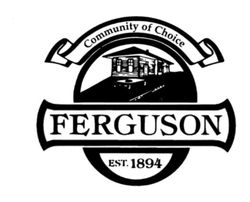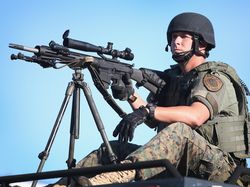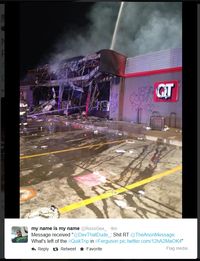
First. Ferguson, Missouri illustrates one of the most important trends of the last decade, the transformation of our suburbs. Ferguson is close to the St. Louis airport, and a location that once meant easy escape now means only noise. Whites have moved further out, along I-70, and their children have moved closer-in, near university campuses. Blacks escaping ghetto conditions have replaced them, drawn by lawns and trees and reasonable prices.
The result is a black city with a white government. The people running the place see their own citizens as an “other,” because the new majority has yet to seize the power their numbers have given them. Not that it would do them much good. In places like Clayton County, Georgia, black government has only accelerated white flight, incompetence followed by bankruptcy and ghettoization. And similar scenes – albeit not as dramatic – took place there as the white structure fought to hang on in the 1990s.

Third, the militarization of police, and the end of the Bush era, has created a fourth “rising of the Klan” in America. Racism has increased dramatically during this Administration. Acting out in racist ways has become rampant. Whether it takes the form of cops wearing riot gear, of westerners pretending they can secede, or just assholes playing “open carry” games, too many white Americans believe that their “feelings” give them a right to “protection” that amounts to rank intimidation.
A lot of this is a hangover from the last decade, something the President has sought to address with words, but has not been able to address through policy. He was so busy saving the economy and dealing with health care when he had a Democratic majority that civil questions took a back seat, and by the time he could address the problems Republicans – increasingly beholden to proto-Klan voters – had taken over the Congress. It’s doubtful anything he could say today would do anything to change policy, because the Congress just would not go along.
Reaction to the events of the last week has also shown the real weakness of the President’s position. It’s not so much the reaction of the right that has me down as that of the left. Tweets that his support of journalism “doesn’t extend to James Risen” or that his support of civil dissent offers carte blanche to police violence – these don’t come from conservatives, they come from liberals. This President is being hurt far more by his friends these days than by his enemies. They’re letting the perfect become the enemy of the good. And they’re making an opportunist like Rand Paul seem like a statesman.

Lincoln, McKinley, and Nixon all lost the support of their own original advocates, who rushed past them as soon as the political winds shifted. Lincoln’s people preferred Grant’s graft and occupation. Teddy Roosevelt’s people buried McKinley as a friend of the “trusts” even though Ohio Republicans had forced John D. Rockefeller to flee for his life. Nixonism became Reaganism, bitter rhetoric matched to deeds.
It does make me wonder whether Hillary Clinton is capable of validating the changes Barack Obama has begun. Maybe Elizabeth Warren might indeed be a better President.










